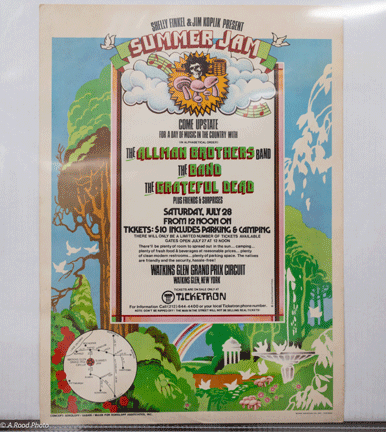In collector’s jargon, it’s known, rather nondescriptly, as FD-26. And, if the price is right, Rockaway Records owner, co-founder, and curator Wayne Johnson wants it. He’s not the only one. An original FD-26 once fetched over $100,000 at auction.
FD-26 has an alias: Skeleton and Roses. Grateful Dead fans know it as the first time those two images were joined in Dead matrimony: on a poster advertising the band’s September 16 and 17 shows at San Francisco’s Avalon Ballroom, promoted by Chet Helms and his Family Dog Productions. Helms was a familiar figure in the mid-1960s Bay Area concert scene- a contemporary of The Fillmore’s Bill Graham- who espoused a kind of “anti-business” model dedicated more to a good time than a bottom line.
At the Avalon, Family Dog booked dozens of shows with artists that would remain synonymous with the musical revolution of the era; The Doors; Buffalo Springfield; Carlos Santana; Janice Joplin. None the least of which was a nascent edition of the Grateful Dead. Family Dog Productions also commissioned local artists to design stylized posters advertising the gigs. So began the FD series.
Centered around an original black-and-white drawing done by Edward Joseph Sullivan, artists Stanley Mouse and Alton Kelley (living on Ashbury Street across from the Dead) added lettering and the vibrant, now-classic red and blue to FD-26, first printed on 14” X 20” sheets of vellum, unwittingly creating a holy grail of concert posters.
“FD-26 is a rare example of value beyond the first printing. The first printing is so valuable that the second printing is worth thousands of dollars. I even sold a third printing for $500. But that’s the exception,” says Johnson. (As of this writing, Rockaway has for sale a 2008 30″ x 41″ reprint of FD-26 signed by Mouse and Kelley, priced at $2,000.)
It’s been Johnson’s life’s work to recognize the exceptions. 42 years ago, he and his brother founded Rockaway in the Silver Lake district of Los Angeles. It was a neighborhood record shop then and for many years after, but has morphed, in the past decade or so, into a collector’s Mecca. Jimmy Page and Chris Robinson are two of the A-list clientele recently stopping by his appointment-only brick and mortar showroom.
Business is booming, and seemingly recession-proof. Demand for rare vinyl and memorabilia is outpacing supply, and Johnson is constantly on the hunt. “We’ve probably sold more rare records than anyone in the world. Selling is the easiest thing for us.” he says. “What’s hard is getting the great stuff.”
Still, at the moment, Rockaway has its share of greatness. An original poster from 1973’s Watkins Glen Summer Jam featuring The Allman Brothers Band, Grateful Dead, and The Band hangs on a wall, not far from framed original art by John Lennon. A glass case protects a trove of Beatles treasures, including a Paul McCartney 1971 promo LP- one of ten known to exist- priced at $20,000. Incredibly, it all pales in comparison to the slice of wall from the Ed Sullivan Theatre, signed by The Beatles, currently offered at $700,000. (Johnson says that may be bargain; in a few years it could be valued north of a million.)
At Rockaway there is a conspicuous amount of merchandise representing the rock bands of the 1960s and ‘70s. Interest in that era remains consistently high, though Johnson does point to avid collectors of Punk and Grunge, or of 78s by blues artists such as Robert Johnson and Charlie Patton, driving those prices skyward, as well. “The important music is always going to be collectible.”
Johnson travels the country hunting for collections- paying upwards of six-figures- and dolling out finder’s fees to those who turn him on to the goods. He stresses that condition and rarity are everything. “If it’s truly rare, I’ll take it in less than very good condition, but really, condition is king.”
And he cautions against selling without experience. “I once offered $2,000 for a George Harrison picture sleeve. The owner turned me down and instead posted it on ebay, without a reserve. I won the auction for $350.”
The pandemic, Johnson says, has transformed the market. Millions of people essentially lived online during quarantine, many exploring his site for the first time, raising demand and prices. Johnson now has a whole new customer base looking to grab the exception; that Beatles ‘butcher’ cover or that elusive FD-26.
“I have to keep the word out to buy collections,” Johnson says. “We can’t get enough.”

